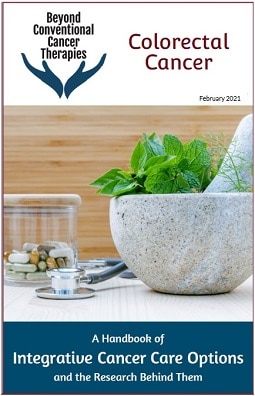Handbooks for cancer types
We’re building further handbooks on broad cancer types. While we’re assembling the new handbooks, we share these from our predecessor site, Beyond Conventional Cancer Therapies.
Colorectal cancer

Ovarian cancer

Resources for other cancer types
Brain cancer
Pangal DJ, Baertsch H et al. Complementary and alternative medicine for the treatment of gliomas: scoping review of clinical studies, patient outcomes, and toxicity profiles. World Neurosurgery. 2021 Jul;151:e682-e692.
Gynecological cancer
Ben-Arye E, Samuels N, Lavie O. Integrative medicine for female patients with gynecologic cancer. Journal of Alternative and Complementary Medicine. 2018 Sep/Oct;24(9-10):881-889.
Lung cancer
Frenkel M, Slater R, Sapire K, Sierpina V. Complementary and integrative medicine in lung cancer: questions and challenges. Journal of Alternative and Complementary Medicine. 2018 Sep/Oct;24(9-10):862-871.
Pancreatic cancer
Frenkel M, David A, Sapire K, Hausner D. Complementary and integrative medicine in pancreatic cancer. Current Oncology Reports. 2023 Mar;25(3):231-242.
Find complementary therapies for each cancer type
You can search for therapies showing benefit for a specific cancer type in our Supplement and Therapies Database. Select a cancer type from the filters along the left side of the page. Supplement and Therapies Database ›
Integrative approaches to cancer treatment
We’re building further handbooks on integrative approaches to cancer treatment.
Integrative, Whole-Person Care: Envisioning Its Potential to Transform the Cancer Journey
CancerChoices advisor Wayne B. Jonas, MD, discusses how integrative, whole-person care can change the journey of a person with cancer in terms of treatments and outcomes, quality of life, and emotional impacts.
Play videoManaging symptoms and side effects
Handbooks on further side effects and symptoms are available on our predecessor site, Beyond Conventional Cancer Therapies:
We’re updating these handbooks and building further handbooks on managing side effects and symptoms.
Body terrain
Learn about what your body terrain is and how it’s related to cancer, cancer treatments, survival, cancer risk, and symptoms and side effects common with cancer.
Handbooks on terrain factors
Levels of some nutrients also impact your response to cancer or cancer treatments, other body terrain factors, and/or your experience of side effects or symptoms common with cancer.
